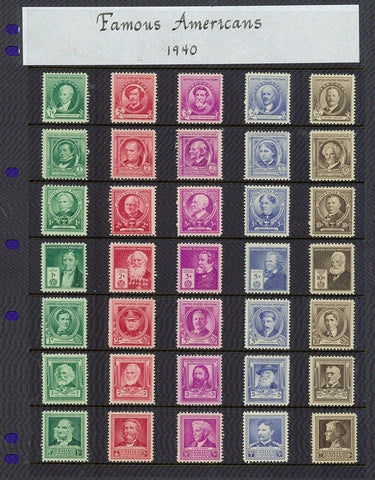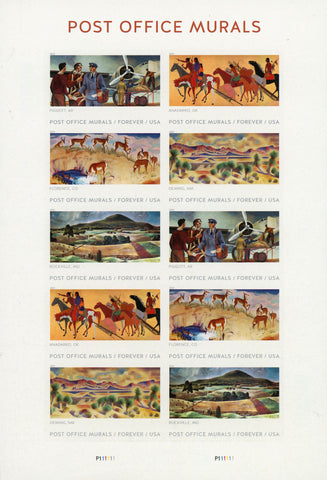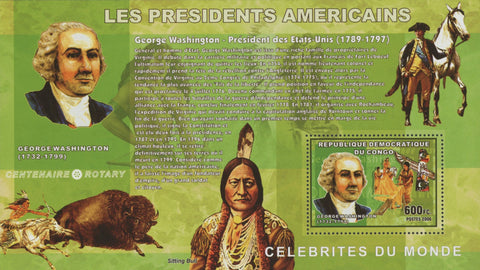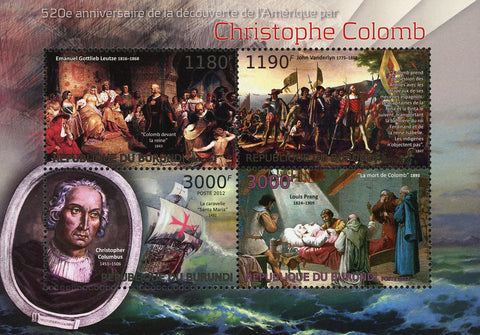Christopher Columbus Imperforated Sov. Sheet of 4 Stamps MNH
- Categories American Culture, Republic of Burundi
Christopher Columbus Imperforated Sov. Sheet of 4 Stamps MNH
Christopher Columbus[a] (/kəˈlʌmbəs/; before 31 October 1451 – 20 May 1506) was an Italian explorer and colonizer who completed four voyages across the Atlantic Ocean that opened the New World for conquest and permanent European colonization of the Americas. Columbus had embarked with intent to find and develop a westward route to the Far East, but instead discovered a route to the Americas, which were then unknown to the Old World. Columbus's voyages were the first European expeditions to the Caribbean, Central America, and South America. His Spanish-based expeditions and governance of the colonies he founded were sponsored by Queen Isabella I of Castile and King Ferdinand II of Aragon, the Catholic Monarchs of the budding Spanish Empire. Columbus never clearly renounced his belief that he had reached the Far East.
Columbus's early life is somewhat obscure, but scholars generally agree that he was born in the Republic of Genoa and spoke a dialect of Ligurian as his first language. He went to sea at a young age and travelled widely, as far north as the British Isles (and possibly Iceland) and as far south as what is now Ghana. He married Portuguese noblewoman Filipa Moniz Perestrelo and was based in Lisbon for several years, but later took a Castilian mistress; he had one son with each woman. Though largely self-educated, Columbus was widely read in geography, astronomy, and history. He formulated a plan to seek a western sea passage to the East Indies, hoping to profit from the lucrative spice trade.
After Columbus lobbied them for years, Ferdinand and Isabella agreed to sponsor a journey west, in the name of the Crown of Castile. Columbus left Castile in August 1492 with three ships, and after a stopover in the Canary Islands made landfall in the Americas on 12 October (later celebrated as Columbus Day). His landing place was an island in the Bahamas, known by its native inhabitants as Guanahani; its exact location is uncertain. Columbus subsequently visited the islands now known as Cuba and Hispaniola, establishing a colony in what is now Haiti—the first European settlement in the Americas since the Norse colonies nearly 500 years earlier. He arrived back in Castile in early 1493, bringing a number of captive natives with him. Word of his discoveries soon spread throughout Europe.
Columbus made three further voyages to the New World, exploring the Lesser Antilles in 1493, Trinidad and the northern coast of South America in 1498, and the eastern coast of Central America in 1502. Many of the names he gave to geographical features—particularly islands—are still in use. He continued to seek a passage to the East Indies, and the extent to which he was aware that the Americas were a wholly separate landmass is uncertain; he gave the name indios ("Indians") to the indigenous peoples he encountered. Columbus's strained relationship with the Spanish crown and its appointed colonial administrators in America led to his arrest and removal from Hispaniola in 1500, and later to protracted litigation over the benefits that he and his heirs claimed were owed to them by the crown.
Columbus's expeditions inaugurated a period of exploration, conquest, and colonization that lasted for centuries, helping create the modern Western world. The transfers between the Old World and New World that followed his first voyage are known as the Columbian exchange, and the period of human habitation in the Americas prior to his arrival is referred to as the Pre-Columbian era.
Columbus's legacy continues to be debated. He was widely venerated in the centuries after his death, but public perceptions have changed as recent scholars have given greater attention to negative aspects of his life, such as his enslavement of the indigenous population in his quest for gold and his brutal subjugation of the Taíno people, leading to their near-extinction, as well as allegations of tyranny towards Spanish colonists. Many landmarks and institutions in the Western Hemisphere bear his name, including the country of Colombia.
Fast & Free Shipping within U.S.A.
We Care for your order, Pack it carefully and ship it within 24 hours.
Satisfaction Guaranteed!
Please explore our store for more stamps, souvenir sheets, post-office collectibles and philately books and pre-philatelic items:
montecinos.philately



















